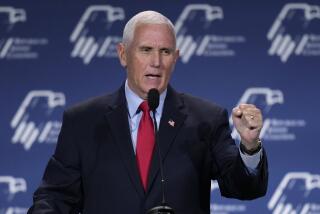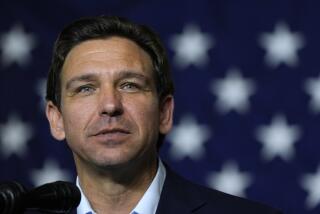Clinton demotes her chief strategist
- Share via
WASHINGTON — Sen. Hillary Rodham Clinton shook up her campaign for the second time in as many months Sunday, demoting her chief strategist and renewing questions about the stability of her campaign for the Democratic presidential nomination.
Mark Penn, a divisive figure who has worked with Clinton and former President Clinton for more than a decade, is considered one of the architects of her campaign.
He has been under increasing scrutiny since Sen. Clinton lost her once-commanding lead and found herself scrambling to stop Sen. Barack Obama’s coronation as the party’s nominee.
Last week, Penn acknowledged that while advising the campaign, he was working on behalf of a proposed trade pact with Colombia that labor unions fiercely oppose. Clinton, who has been courting union members, especially ahead of the April 22 Pennsylvania primary, has said she will vote against the treaty in the Senate.
Clinton campaign manager Maggie Williams said in a statement Sunday that Penn had asked “to give up his role as chief strategist,” but would “continue to provide polling and advice to the campaign.”
Political strategists say that campaign shake-ups rarely register much with voters. But Penn’s demotion reinforces an image of disarray in a campaign that has tried to focus on Clinton’s experience and readiness to be, as she says, “commander in chief on Day One.”
Because the change is not a total break with Penn, the demotion may not mollify influential labor groups who for months have hammered Clinton for retaining Penn while his firm -- public relations behemoth Burson-Marsteller, where he is worldwide president and chief executive -- worked for clients with allegedly anti-labor agendas.
“This goes to the bigger point that Hillary Clinton has been terribly ill-served by her campaign,” said Peter Fenn, a longtime Democratic strategist. “She’s a strong candidate. But I’m pretty appalled at what the campaign has done.”
Penn, a longtime member of the Clintons’ inner circle, began working with President Clinton in the mid-1990s, helping steer his reelection effort in 1996. He was Hillary Clinton’s pollster and message guru in her 2000 Senate campaign.
When she began her campaign for president, it was Penn’s strategy to cast her as a seasoned politician and the inevitable choice to put a Democrat back in the White House.
As the election season unfolded, however, voters seemed less entranced by Washington experience than by the hope of change offered by Obama.
Clinton’s stumble in the Iowa caucuses in early January -- in which the Obama campaign was credited with out-organizing her -- led to questions about Penn’s leadership that have only intensified since.
Campaign aides said Penn was late in letting Clinton showcase a warmer, more human side that some voters hoped to see.
Aides also have also complained about Penn’s unilateral style. After Clinton’s defeat in South Carolina, for example, Penn gave the staff a PowerPoint presentation on a new approach in which Clinton would emphasize her commitment to solving specific problems.
Unimpressed, some staff members asked whether Clinton had already approved the plan; Penn said she had. Mandy Grunwald, who handles advertising, asked with frustration: “Why are we meeting about it then,” according to one person who was present.
For months, senior Clinton aides went to Clinton and demanded that Penn’s role in the campaign be diminished. They did not believe it was smart for him to serve as both pollster and strategist.
Clinton resisted, siding with Penn and letting him keep his broad portfolio. Even after Obama surged ahead of Clinton in February, Clinton replaced chief of staff Patti Solis Doyle rather than Penn.
It is unclear whether Penn’s demotion will satisfy his detractors or stabilize the campaign in the crucial final months of the primary season.
“When you add to it the already contentious relationship he had with so many internally in the campaign and externally, he really should have been fired,” one Clinton aide said Sunday, speaking on the condition of anonymity while discussing internal campaign dynamics.
Though he will no longer have the grand title of chief strategist, he will continue to “wield power,” the aide said.
Other people close to the campaign suggested that out of loyalty or trust, Clinton had allowed Penn to harm her chances for the nomination.
“This is the fight of her life, and he didn’t do her any great service by putting her in this position that she had to make this choice,” said one person familiar with the campaign’s operations. “You’re on the one-yard line and you’re pulling your quarterback.”
Most uncertain is the effect that the heightened scrutiny of Penn’s demotion may have on Clinton’s attempts to woo working-class voters.
Union leaders have been complaining for months about the work Penn’s firm has done for companies such as uniform manufacturer and launderer Cintas Corp., which Burson-Marsteller has helped to fight a unionization drive.
Last week’s revelations about Penn’s work for the Colombian government only intensified the grumbling.
After a report in the Wall Street Journal, Penn acknowledged he had met with Colombian Ambassador Carolina Barco to discuss a pending trade deal, which the Colombian government and the Bush administration are trying to get through Congress.
On Friday, Penn released a brief statement in which he called the meeting “an error in judgment” and apologized.
The meeting was particularly embarrassing because Clinton has campaigned against new trade agreements and vowed to renegotiate the North America Free Trade Agreement drawn up by her husband’s administration.
Colombia has since canceled its contract with Penn’s company.
Fenn, the Democratic strategist, said Penn’s demotion might reflect union unhappiness as much as anything. But he cautioned that Penn’s continued influence could be a problem. “I think a clean break is always best,” he said.
The move means an enhanced role for Howard Wolfson, the campaign’s communications director, who had clashed with Penn over Penn’s advice that Clinton portray herself as tough and experienced while downplaying other qualities. With Wolfson in a more commanding position, Clinton’s softer side might get more emphasis.
Working with Wolfson will be Geoff Garin, a veteran pollster with long ties to labor.
In an interview with The Times in December 2006, before Clinton had declared her candidacy, Garin said one of the campaign’s challenges would be controlling her team.
“The question is: Will she be able to put something together that’s disciplined and decisive?” Garin said at the time.
--
peter.nicholas@latimes.com
Times staff writer Stephen Braun contributed to this report.
More to Read
Get the L.A. Times Politics newsletter
Deeply reported insights into legislation, politics and policy from Sacramento, Washington and beyond. In your inbox twice per week.
You may occasionally receive promotional content from the Los Angeles Times.











